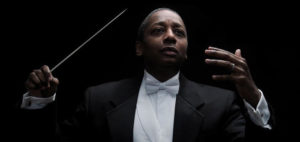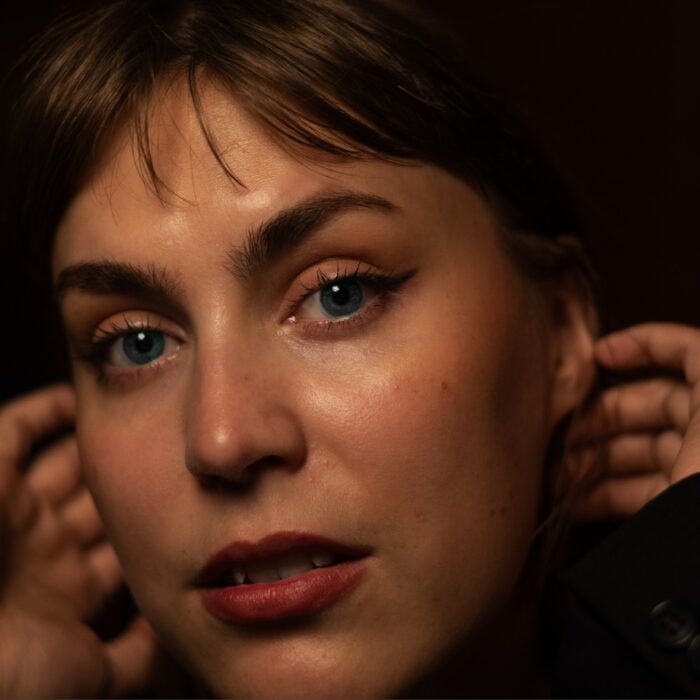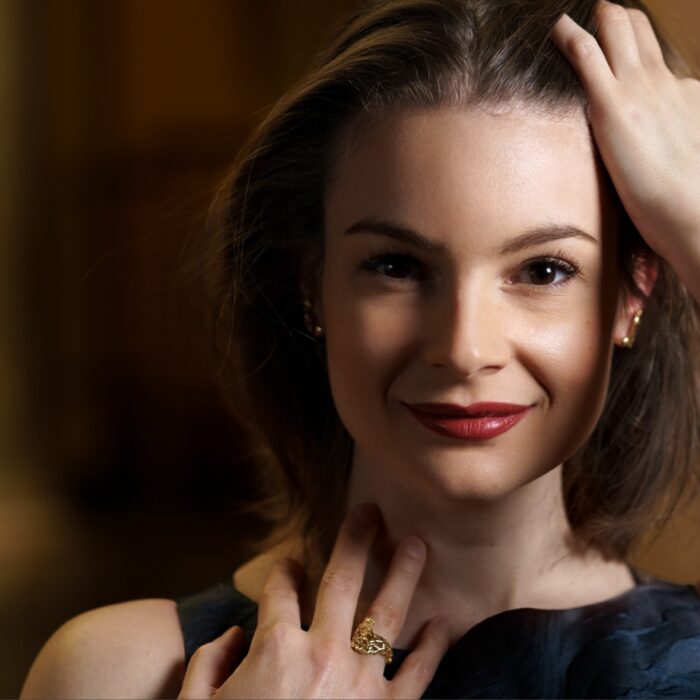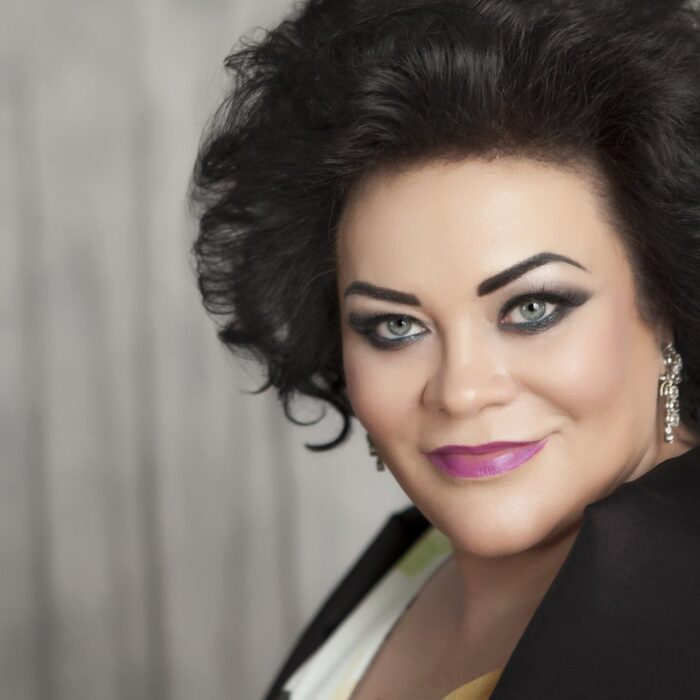
Q & A: Marlon Daniel on the Chevalier de Saint-Georges & Systematic Racism in Classical Music
By David SalazarFew artists have dedicated themselves to championing the works of composers of African and African American descent the way that conductor Marlon Daniel has.
A Chicago native, Daniel has performed new works by such composers as Fred Onovwerosuoke, Dominique Le Gendre, and Adolphus Hailstork, among others. He also founded the Festival International de Music Saint-Georges in Guadaloupe and was the first conductor to lead a performance of the composer’s long-lost opera “L’Amant Anonyme” in over 230 years. He was also the inaugural music director of the Colour of Music Festival in Charleston, South Carolina.
Daniel, a winner of the “Special Talent Award” at the 2018 Bucharest Symphony Orchestra’s International Conducting Competition, has also premiered several new works by contemporary composers around the world.
The conductor, who recently started working as the Director of Orchestral Ensembles at Fordham University, recently spoke to OperaWire about his career, the music of Chevalier de Saint-Georges and other black composers, and the systematic racism inherent in the world of classical music.
OperaWire: You founded the Saint-Georges International Music Festival. How did this project come about?
Marlon Daniel: An official Festival of Guadeloupe, the Festival International de Musique Saint-Georges is the most prestigious classical music festival in the Caribbean. It is a tribute to Joseph Bologne, Chevalier de Saint-Georges (1745-1799), the greatest fencer of his time and a colonel at the time of the French Revolution. He was a violinist, conductor and composer who influenced the great composers of his time, including Franz Joseph Haydn and Wolfgang Amadeus Mozart and authors such as Alexandre Dumas.
The festival is one of the most unique music festivals in the Caribbean and shows an unprecedented cultural richness and diversity, offering a plethora of spectacular concerts and cultural and educational events (conferences, masterclasses, workshops and exhibitions) featuring renowned international artists throughout the archipelago of Guadeloupe.
OW: How has it evolved over the years? What were some of the greatest challenges you’ve had to overcome in building the festival to what it is today?
MD: The festival was originally started as an experiment in 2011 to test the viability of having an international festival in the homeland of Chevalier de Saint-Georges. The results were overwhelming but we also found out that it would be a tremendous amount of work to sustain the festival. It took several years to form a team and build an infrastructure, while navigating geopolitical and social changes in Guadeloupe, including considerable shifts in political parties and governmental support for the arts. Part of the issue was that we were tied to the government for our primary funding.
So in 2016, I worked with a team of dedicated musicians, historians, academics and social activists and we created the ‘Association Festival International de Musique Saint-Georges’ which is the equivalent of a non-profit organization in the US and a Verein in Germany. This Association is the foundation and spearhead of the festival as we know it today.
OW: What are some future goals you have for the festival?
MD: We are still a new festival and my goals are based on building sustainability and quality. I want to be careful not to grow too big too fast. We still heavily rely on governmental grants and I’d like to become independent from those and attract a larger and more diverse group of sponsors. On an artistic and musical note, I want to present some of the most exciting and diverse emerging artists on the concert stages today. Not necessarily the most famous; I’m a big fan of the underdog because I am one. I am especially fond of giving rising stars a platform.
OW: You are a major champion of the works of Chevalier de Saint-Georges. What makes his musical style distinct and unique?
MD: What we know as the “Classical Style” is epitomized in the music of Saint-Georges. We believe today that this period was exclusively the domain of composers of the Austro-Hungarian Empire. Saint-Georges’ existence proves otherwise. Many of the 18th-century composers who we today consider great like Haydn and Mozart were influenced by Saint-Georges.
If it wasn’t for Napoléon, the French Revolution, slavery, and systematic racism, we would have much more of his output. If I was to characterize his style, it would be classical, rooted in Rococo flourishes that almost anticipates the virtuosity of later Romantic period composers.
OW: You also premiered his “L’amant anonyme.” How do you define the Chevalier de Saint-Georges’ operatic musical language?
MD: It’s difficult to characterize an operatic style as “L’amant Anonyme” is the only surviving complete opera of Saint-Georges. What we can say is that we see in this and other vocal works by Saint-Georges a clear focus on combining the vocal agility and virtuosity of Baroque operas with beautiful melodies and ensemble numbers that move the plot along.
One can only wonder how Saint-Georges’ style would have evolved and the effect on history had he been allowed to take the position of artistic director of the Académie Royale de Musique, now known as the Paris Opera. Unfortunately, a 1776 petition to Queen Marie Antoinette from the three leading opera divas assured Her Majesty that “their honor and delicate conscience could never allow them to submit to the orders of a mulatto.” Rather than embarrassing the queen, with whom Saint-Georges had a close relationship, he withdrew his name.
OW: Let’s talk about your musical journey. What inspired you to dive into the world of classical music?
MD: I grew up in Chicago Illinois and began my musical career as a pianist at a young age. I was encouraged by my grandmother who was a big fan of PBS. I remember growing up watching Great Performances and Live from Lincoln Center. Unfortunately, there were not so many musicians of color on these shows. However, as a young pianist, I was inspired by pianist André Watts and conductor Paul Freeman. I studied at the North Shore Music School and the American Conservatory of Music but the turning point in my life was meeting French pianist Cécile Ousset. She advised me to leave Chicago. I wanted to go with her to France but was too young or too scared to travel to Europe. So, after graduating high school, I settled on New York and Manhattan School of Music. I did follow this dream later studying French language at the Sorbonne in Paris and piano at Fontainbleau with Gaby Casadesus.
I discovered conducting in my last year at Manhattan School of Music. I had seen Daniel Barenboim conduct a Mozart concerto from the keyboard. I thought this was a fantastic idea. So, I gathered many of my string-playing friends and put on a concert. I performed Mozart’s Piano Concerto in B-Flat Major, K. 595 from the keyboard, and a few other orchestral works. The extraordinary thing is that it went so well all my friends declared me a hero for the performance and wanted to know when the next concert would take place. So, I decided to really study conducting. This led me to studies at the Prague Academy and eventually the mentorship of renowned Finnish pedagogue Jorma Panula.
OW: What are some of the most memorable moments in your career to date?
MD: Actually, I am torn between three memorable moments: The first was when I conducted the Russia premiere of William Grant Still’s Afro American Symphony. Though this piece is very common among American conductors (especially Black conductors in the month of February) to my surprise it had never been performed in Russia. I felt like I was carrying the tradition and reputation of my country and all Black classical musicians on my shoulders. The composer’s daughter wrote a letter declaring me a champion of her father’s works. I have never been so proud.
The second was in 2017 when I conducted the Orquesta Sinfónica Nacional de Cuba (National Symphony of Cuba), where I was the first American conductor invited since President Obama lifted the U.S. embargo of Cuba in 2015 and the only African American to conduct the orchestra in the orchestra’s sixty-year history.
The last is after a community engagement concert featuring the music of Saint-Georges entitled ‘Before There Was Mozart’ in the Bahamas. The performance attracted an incredible four hundred (400) kids. All these kids were so engaged with the story and music! They could not believe that a classical music concert featured a composer that looked just like them. But what really made this a special moment was afterward a little girl came to me and said “I never knew there was such a thing as a Black conductor. Now I feel like I can do anything.” I will never forget this moment.
OW: The conversation regarding racial inequality is pervading our society and the world of classical music is finally having those conversations as well. In speaking with other Black artists, all of them have identified instances in which they have been subjected to racist behavior in the work environment. I would like to know about your experience in this regard.
MD: All vocations in life have hurdles. Like all musicians of color in classical music I have had these experiences, but this never deters me from my path. If only I had a dollar for when I tell someone I’m a conductor, they look at me and ask which railway or subway line? I hope the day will come when, even on the steps of Lincoln Center sometimes, I don’t need to explain, a “music conductor.”
Music is a powerful tool to bring people together. I feel that I have been put on this earth to do just that. I do this not for money or fame but for love and to bring mutual understanding to the world, and maybe along the way, make myself a better person.
More and more artists of color are performing on the classical stages of the world. No one can deny their existence anymore by saying “they don’t exist.” Today we forge ahead sometimes even against great resistance not only into the more recent realm of opera but also the orchestra and concert stages.
Being a Black conductor is the rarest role of all. Black conductors are rare because of the aspect of role reversal, especially in the United States where musicians of color represent less than two percent of the field. A Black man leading white people? In some places, this can be a problem because of the sometimes-hidden systematic racism that drags our society back to the insidious times of the Code Noir and Jim Crow laws that we thought we left behind.
OW: What do you think needs to happen to truly have racial equity in the world of classical music. What are some changes on any level that you would like to see?
MD: I think the first thing that needs to happen is that the classical world has to acknowledge the problem and do something about it. Grant giving organizations and foundations need to give money to organizations that are already diverse in addition to organizations that need greater diversity. These smaller organizations seem to never get the recognition, opportunity or funding necessary to grow.
Finally, organizations that are not diverse need to stop doing “community outreach” but instead “community engagement;” one or two concerts in an urban neighborhood dose very little. Instead, they should hire more diverse musicians, ones that reflect the community of which they are so desperately trying to help and use these diverse musicians as leaders and advisors.
OW: As a champion of works by Black composers, what are some of the operas by Black composers that you feel should be a part of the standard repertory and why?
MD: I have never really thought of myself as an expert or champion of Black composers, but I guess after more than 20 years on stage it all adds up. This all came from a need to identify with composers and performers that looked like me. If I didn’t perform these composers’ works, who would?
As far as operas there are many, but what immediately comes to mind are more contemporary works like Anthony Davis’ opera “X, The Life and Times of Malcolm X,” Terence Blanchard’s “Fire Shut Up in My Bones,” Nkeiru Okoye’s “Harriet Tubman “and there are several operas by William Grant Still that are wonderful. I love opera and hope for opportunities to conduct more in the future. In fact, next season I will lead Opera Créole’s new production of Still’s “A Bayou Legend” at the Marigny Opera House in New Orleans.


